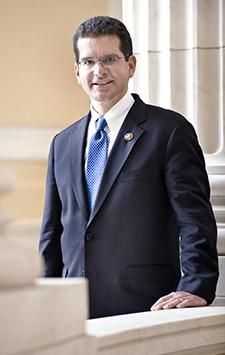Making the Case for Statehood
Puerto Rico's Congressman Argues the Island's Status as a Territory Has Contributed to its Economic and Political Struggles
New York, September 30, 2015—Puerto Rico’s status as a territory of the United States is the root cause of the island’s political and economic struggles, U.S. Congressman Pedro Pierluisi told Columbia Law School students, faculty, and guests at a Sept. 28 event sponsored jointly by Social Justice Initiatives and the Latino/a Law Students Association.
| Puerto Rico's U.S. Congressman Pedro Pierluisi argued in favor of statehood for the territory in a speech at Columbia Law School. Photo courtesy of Congressman Pierluisi's office. |
“Puerto Rico’s status is the underlying problem from which nearly all of our other problems emanate,” said Pierluisi, who has been the island’s sole member of Congress in a position known as Resident Commissioner since 2009.
In his remarks, Pierluisi, who is vying to become the territory’s governor, argued Puerto Rico should be made a state. He said its current status as a territory is “illogical and inhumane,” noting that Puerto Ricans—who are U.S. citizens—are left out of or shortchanged in many federal programs including those dealing with health care and disability benefits. Worse, he said, although his constituents serve in the U.S. military in large numbers, they cannot vote for their commander in chief, the U.S. president.
“What does it mean to be a territory?” Pierluisi asked. “It means to be deprived of political rights and equality under the law.”
Even Pierluisi’s role is limited; he can vote in committee but not on the House floor. Meanwhile, if a Puerto Rican moves to the mainland U.S., he or she immediately obtains all the rights that are denied to island residents.
In a 2012 nonbinding referendum, Puerto Ricans voted in favor of statehood for the first time. Pierluisi introduced the bipartisan Puerto Rico Statehood Admission Process Act earlier this year, calling for a federally sponsored vote using $2.5 million set aside by Congress specifically for that purpose. If Puerto Ricans favor statehood in that vote, the bill lays out a path for joining the United States.
“This is an aggressive plan to be sure, but the status quo is completely intolerable,” Pierluisi said.
Pierluisi took questions from students and community members following his remarks. On Sept. 29, he spoke about Puerto Rico’s status at a Senate Finance Committee meeting on the territory’s financial and economic challenges.
Professor Christina Duffy Ponsa, author of Foreign in a Domestic Sense: Puerto Rico, American Expansion, and the Constitution, introduced Pierluisi at the Columbia Law School event.
